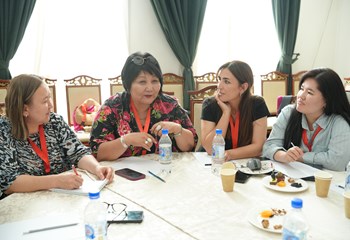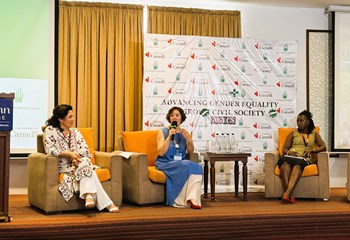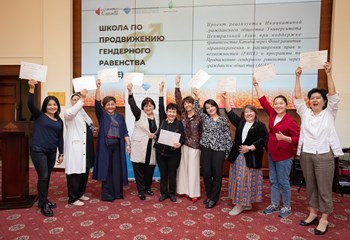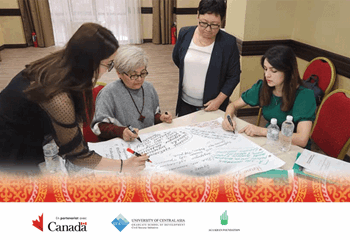School for the Advancement of Gender Equality
Background
University of Central Asia’s (UCA) Civil Society Initiative with support from the Government of Canada-funded Regional Programme, Foundations for Health and Empowerment Education (F4HE), and Advancing Gender Equity through Civil Society (AGECS) continues the implementation of its Program, and more specifically, announces the launch of the Cycle II (2022-2023) of the School for the Advancement of Gender Equality (SAGE).
School for the Advancement of Gender Equality aims to assist gender advocacy organizations, women led organizations, as well as activists, journalists, bloggers working on gender issues, strengthen their capacity in the areas of gender equality and gender advocacy, provide a platform for peer-support, knowledge sharing and learning, and pilot innovative projects through the Small Grants component.
More specifically, through Advancing Gender Equity through Civil Society (AGECS), successful applicants for SAGE will be enrolled from January - December 2023 in the following series of capacity-building activities:
Component 1: Kick-off Workshop (tentatively planned for January 27th, 2023 in each country)
CSI will convene a face-to-face Kick-Off Workshop for selected participants in each target country of the program: Kyrgyzstan and Tajikistan.
The one-day kick-off workshop will be led by the project team. It will be highly interactive and will also be a great opportunity for participants to network and build their community by getting to better understanding “who does what”, what are the current practices and approaches of the participating organizations in the areas of gender equality and gender advocacy, along with their current needs in terms of the expertise, knowledge, tools. The event will provide an overview of the working modalities of the Advanced Gender Advocacy program, as well as other components of the one-year program.
All participants will be invited to join the Online Community of Practice (CoP), which brings together both graduates and current participants of the program. The CoP will allow participants to exchange views, practices, share and learn from each other, as well as expand their networks
Component 2: Advanced Gender Advocacy Program (February – May 2023)
Following on the Kick-off workshops, as well as building on the successfully implemented Advanced Gender Advocacy Program (Cohort 1: 2021-2022), participants of Cohort 2 will attend an Online Advanced Gender Advocacy Program that will feature more than 10 thematic areas, delivered within 10 to 12 weeks, tailored to the areas of interest of the participants. Participants are expected to dedicate between 4-5 hours per week.
The program will highlight the value of the ecosystem-based approach to gender advocacy and gender equality; provide tips for career development for professionals working in the field of gender advocacy; with support with practices related to institutional readiness for gender advocacy; bring in elements of Trainer of Trainers (ToT); present gender advocacy tools through the lens of various sectors such as education, health, climate change, procurement, domestic violence, others. The program will also focus on important aspects of conducting research and data based/evidence-based approaches for policy development, along with monitoring, evaluation and learning (MEL).
Each theme/topic will be led by a national or regional expert, with practical experience in the field.
Each week will have a topic/theme. Participants will have access to reading materials and an expert video presentation on each topic. Additionally, each week, a thematic online workshop will be organized by the thematic expert to discuss, debate, learn and share with participants more in-depth on the topic; the week will culminate with an assignment. All assignments will be graded, and participants who will accumulate at least 70 points total, will be eligible for a Certificate for Successful Completion of the Program. Participants will have access to an online platform where all materials will be made available on a weekly basis. Additionally, participants will receive weekly updates on their progress, with feedback from the expert of the week and a number of points accumulated per week.
Component 3: Small Grants Program (May – October 2023)
Following the completion of the Advanced Gender Advocacy Program, the Small Grants component will provide graduates of Cohort 2 with the opportunity to move from theory to practice, and more specifically, supporting and advancing gender equality in Kyrgyzstan and Tajikistan through innovative interventions which have a transformational potential. The program encourages out-of-box thinking, encourages participatory research, using open data and evidence-based approaches along with advocacy. Here are few potential examples of the types of projects which might be considered:
- Small projects which are promoting examples of gender mainstreaming practices, by organizing practical demo-sessions with relevant stakeholders, which can showcase the value of involving both men and women in consultations of local or national policies, in planning of local interventions, etc;
- Projects promoting systemic change by strengthening legal frameworks and holding governments and institutions to account – conducting review of the legislation, identifying gaps and discussing potential improvements with relevant stakeholders;
- Projects promoting activities with focus on education, training, and information for girls and women on potential opportunities: i.e. economic empowerment, choice of profession/occupation, or career development, etc.
- Innovative approaches to using social media and technology to promote, educate, raise awareness about emerging gender issues;
- Projects aiming at strengthening the professional communities of gender advocates, through peer-learning & sharing;
- Projects supporting the use of participatory research findings to inform the ongoing efforts around gender-responsive and gender-transformative policies and interventions that can improve the proposed thematic areas/sectors;
- Initiatives aiming to strengthen participatory research collaboration and learning exchange between public institutions (central or local government level), civil society organizations, media, developers’ community, private sector, to understand the relationships between gender aspects and various thematic areas and/or sectors (i.e. gender & education, gender & climate, gender & public procurement, gender & health, etc)
- Others (to be defined by the program team closer to the launch of the call).
Applicants will also need to articulate: how their initiative is contributing to the achievement of the SDG Goal 5 - Achieve gender equality and empower all women and girls.
CSI plans to award $5000 within the duration of six months for 10 advocacy grants per cycle.
Component 4: Regional Forum
At the end of the program, a two-day regional forum will be organized, which will be attended by successful graduates of the second group, including finalists of the small grants program.
The Forum will be organized outside the countries of the School participants. This will allow participants to become familiar with best practices in gender equality and gender advocacy in the host country. (For example, the Regional Forum 2022 was organized in Almaty, Kazakhstan).
The main objective of the Regional Forum is to strengthen the Community of Practice (CoP) of gender advocates from both target countries; providing an opportunity for participants from Kyrgyzstan and Tajikistan to share, exchange opinions and practices, present, discuss, and moderate discussions on a wide range of gender advocacy issues. The Forum also aims to showcase best practices and learn from civil society peers in the host country, establish partnerships and explore potential opportunities for future collaboration.
The regional forum ends with a ceremony for awarding certificates for successful completion of the school.
Selection criteria
Ideal candidates for the SAGE School of Gender Equality include women in leadership positions in organizations; researchers or gender activists, independent or working within civil society organizations, think tanks, public organizations, universities or research centers in Kyrgyzstan and Tajikistan. Applicants with independent journalism experience, bloggers and activists working on gender issues are strongly encouraged to apply.
All candidates must demonstrate:
- Good understanding of gender equality issues.
- Experience in implementing advocacy campaigns (at least 2-3 projects or initiatives, either at the local or national level), experience using social media tools to conduct gender advocacy campaigns, promote content, etc.
- Organizational capacity to develop and implement project proposals, financial reporting and donor relations.
- Experience in implementing initiatives and projects aimed at expanding equal opportunities for women and adolescent girls in the field of training and education, healthcare, employment, entrepreneurship, access to economic resources, etc.
- Experience, knowledge and motivation to support the advancement of women into leadership positions (at national or local level) and provide equal opportunities for their growth and development.
- Experience in developing and promoting materials (videos, articles, etc.) dedicated to the problems of women and girls in one's country is an advantage.
- Motivation to become part of a community of practice and to actively contribute to it.
- Experience using MS Office (i.e. Access, Excel, OneNote, Outlook, Powerpoint, Word).
- Google-Suite (Calendar, Documents, Forms, Gmail, Google Drive, Hangouts, Sheets, Slides).
- Social networks and online communication tools such as Zoom, Teams, Google Meet.
- Access to fairly stable internet.
- Fluency in Russian, knowledge of English is an advantage.
- Opportunity to fully participate in all program events, both offline and online.
- Additional: Experience and knowledge aimed at assisting in the development, compliance and implementation of new and existing laws and policies in the area of gender equality, challenging discriminatory practices, and changing social norms and practices towards the realization of equal rights for women and men.
The University of Central Asia's Civil Society Initiative is a diverse, inclusive and equitable organization that encourages all interested applicants, regardless of their gender, race, ethnicity, national origin, age, sexual orientation or identity, education or disability, to apply.
Application process and deadlines
As part of the application process, candidates are asked to complete the Application Form: https://forms.gle/jCYsheVoJ95MUtKm7
All interested candidates must submit their completed Application Form no later than January 9, 2023 at 18:00 (Bishkek time).
All questions regarding the School for the Advancement of Gender Equality or the application process may be directed in writing to csi@ucentralasia.org or to Ikrom Abdullaev at ikrom.abdullaev@ucentralasia.org
The selection process is open and transparent and participants will be selected based on the criteria set out, when completing the application, responses must clearly meet these points:
Clarity of answers provided in the Application Form: https://forms.gle/jCYsheVoJ95MUtKm7
Relevance of technical expertise and experience in advocacy/analysis of gender policies of the applicant/nominated participant.
(If applicable) Relevance of organizational experience.
If additional information or clarification is required on an application, the applicant(s) will be notified in writing and will be asked to provide additional information and/or documentation.
Selected applicants will be notified by January 13, 2023 of the outcome of their application.








